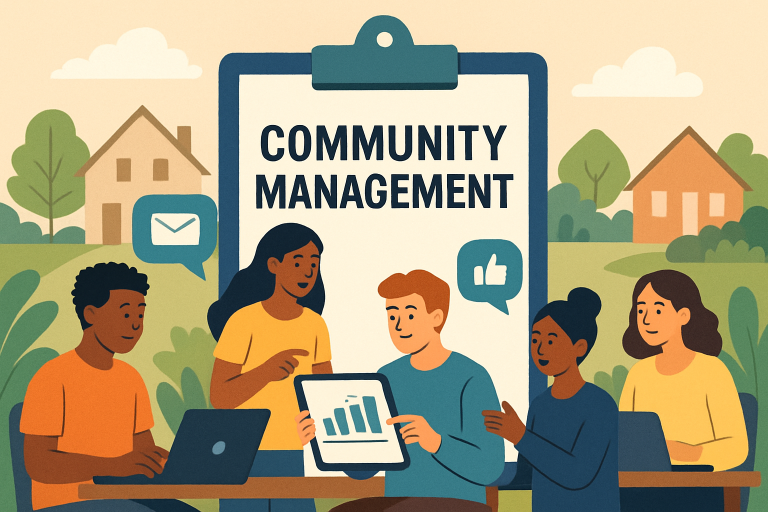Innovative strategies for effective HOA management
Key Takeaways:
- Embracing technology enhances communication and operational efficiency in HOAs.
- Transparent financial practices build trust and ensure fiscal responsibility.
- Proactive maintenance and community engagement foster a thriving living environment.
Table of Contents:
- Introduction
- Leveraging Technology for Enhanced Communication
- Transparent Financial Management
- Proactive Maintenance Strategies
- Fostering Community Engagement
- Legal Compliance and Governance
- Final Thoughts
Introduction
Homeowners Associations (HOAs) play a crucial role in shaping residential communities’ quality, safety, and long-term value. Effective management is not simply about enforcing rules—it demands thoughtful planning, transparent communication, and a willingness to adopt new tools and techniques.
Modern HOA management combines these elements, helping associations streamline daily operations while fostering stronger community trust. By adopting forward-thinking strategies, HOAs can optimize their operations and ensure the well-being of every resident. An excellent starting point to help achieve these objectives is working with experienced providers who specialize in community-focused solutions.
Given rapidly evolving resident expectations and technological advancements, today’s HOA leaders must remain agile and proactive. Implementing new approaches preserves property values and elevates resident satisfaction and engagement. As HOAs strive for a seamless balance between financial responsibility and community engagement, innovative methods can propel communities beyond traditional boundaries.

Leveraging technology for enhanced communication
Digital transformation has revolutionized almost every industry—and HOA management is no exception. Deploying community portals, mobile apps, and automated notification systems has made communication between board members, property managers, and residents more accessible and efficient. Online platforms enable instant updates and centralize important documents, event calendars, and maintenance requests for easy access by homeowners. According to Forbes, technology in property management helps drive satisfaction by creating frictionless experiences and reducing operational inefficiencies.
Effective utilization of these platforms grants board members real-time insight into residents’ needs and concerns. It facilitates polling, discussion forums, and streamlined issue reporting, empowering community members to voice opinions or highlight concerns.
Transparent financial management
Fostering trust through financial transparency is fundamental. Homeowners expect clarity on how dues are spent, and proactive HOAs respond by sharing itemized annual budgets, monthly expenditure updates, and projected reserve funding needs. This practice empowers residents and helps prevent misunderstandings or disputes regarding financial decisions. Third-party audits further reinforce accountability, minimizing the risk of mismanagement or errors.
Innovative HOAs now deploy accounting software tailored for community associations, automating invoicing, collections, and reporting. Residents can track assessments and payments online, giving them real-time insight into their contributions. Open forums and annual budget reviews promote fiscal education, helping residents understand reserve funding and contingency planning better.
Proactive maintenance strategies
Preserving community assets requires more than reactive repairs—it requires a planned, systematic approach. Leading HOAs create maintenance calendars that go beyond immediate fixes, outlining regular inspections, seasonal upkeep, and long-term capital repairs. This ensures infrastructure longevity and resident safety while also helping board members anticipate budgetary needs for major projects.
Maintenance management software provides boards with the organizational tools to assign jobs, track repairs, and monitor vendor performance. Regular reporting and photographic records make it easier to satisfy insurance or regulatory requirements and can expedite claims or reimbursement. A strong preventative maintenance program ultimately shields the community from costly emergencies.
Fostering community engagement
A vibrant HOA actively encourages resident interaction and shared decision-making. Hosting community gatherings, educational sessions, or volunteer clean-up events instills camaraderie and strengthens neighborhood ties. Creating specialized committees — such as those for safety, landscaping, or social programs — empowers residents to take ownership of their surroundings and feel an integral part of the community.
Open channels for feedback, such as digital suggestion boxes or periodic surveys, further reinforce inclusion and transparency. By recognizing resident achievements and celebrating milestones, HOAs establish a culture of appreciation. Involving diverse voices in annual planning or policy changes leads to more robust, widely supported initiatives while reducing the potential for conflict.
Legal compliance and governance
Navigating the legal landscape is paramount for any responsible HOA. Board members must remain vigilant about state and local law changes, fair housing regulations, and new operational standards. Partnering early with legal counsel and staying updated through resources like Realtor.com ensures the association’s governing documents stay relevant, enforceable, and up to code.
Clear, accessible bylaws and guidelines help prevent ambiguity and support consistent enforcement. Regular governance training for board members strengthens the community’s foundation and prepares leaders for evolving challenges. By emphasizing educative over punitive measures, HOAs foster understanding and voluntary compliance.
Setting a gold standard for community living
Innovative HOA management is multi-dimensional, defined by agile leadership, a commitment to transparency, and a culture of proactive care. Strategic use of technology, robust financial controls, and inclusive engagement transform traditional communities into thriving, resilient neighborhoods.
As HOAs embrace these progressive practices, they pave the way for heightened resident satisfaction, fiscal health, and sustained property value—setting a gold standard for community living.




